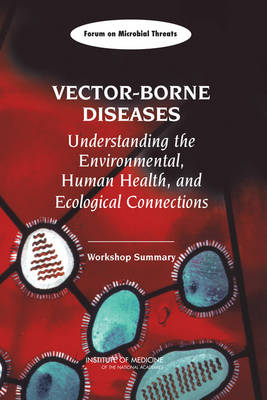
Vector-Borne Diseases
Understanding the Environmental, Human Health, and Ecological Connections: Workshop Summary
Seiten
2008
National Academies Press (Verlag)
978-0-309-10897-3 (ISBN)
National Academies Press (Verlag)
978-0-309-10897-3 (ISBN)
Provides an account of the individual presentations, it also reflects an important aspect of the Forum philosophy. This title contains proceedings that summarize the statements of participants in the workshop and are intended to be an exploration of the subject matter or a representation of consensus evaluation.
Vector-borne infectious diseases, such as malaria, dengue fever, yellow fever, and plague, cause a significant fraction of the global infectious disease burden; indeed, nearly half of the world's population is infected with at least one type of vector-borne pathogen (CIESIN, 2007; WHO, 2004a). Vector-borne plant and animal diseases, including several newly recognized pathogens, reduce agricultural productivity and disrupt ecosystems throughout the world. These diseases profoundly restrict socioeconomic status and development in countries with the highest rates of infection, many of which are located in the tropics and subtropics.
Although this workshop summary provides an account of the individual presentations, it also reflects an important aspect of the Forum philosophy. The workshop functions as a dialogue among representatives from different sectors and allows them to present their beliefs about which areas may merit further attention. These proceedings summarize only the statements of participants in the workshop and are not intended to be an exhaustive exploration of the subject matter or a representation of consensus evaluation. Vector-Borne Diseases : Understanding the Environmental, Human Health, and Ecological Connections, Workshop Summary (Forum on Microbial Threats) summarizes this workshop.Table of Contents
Front Matter
Summary and Assessment
1 Vector-Borne Disease Emergence and Resurgence
2 Vector-Borne Disease Detection and Control
3 Integrating Strategies to Address Vector-Borne Disease
Appendix A: Agenda
Appendix B: Acronyms
Appendix C: Forum Member Biographies
Vector-borne infectious diseases, such as malaria, dengue fever, yellow fever, and plague, cause a significant fraction of the global infectious disease burden; indeed, nearly half of the world's population is infected with at least one type of vector-borne pathogen (CIESIN, 2007; WHO, 2004a). Vector-borne plant and animal diseases, including several newly recognized pathogens, reduce agricultural productivity and disrupt ecosystems throughout the world. These diseases profoundly restrict socioeconomic status and development in countries with the highest rates of infection, many of which are located in the tropics and subtropics.
Although this workshop summary provides an account of the individual presentations, it also reflects an important aspect of the Forum philosophy. The workshop functions as a dialogue among representatives from different sectors and allows them to present their beliefs about which areas may merit further attention. These proceedings summarize only the statements of participants in the workshop and are not intended to be an exhaustive exploration of the subject matter or a representation of consensus evaluation. Vector-Borne Diseases : Understanding the Environmental, Human Health, and Ecological Connections, Workshop Summary (Forum on Microbial Threats) summarizes this workshop.Table of Contents
Front Matter
Summary and Assessment
1 Vector-Borne Disease Emergence and Resurgence
2 Vector-Borne Disease Detection and Control
3 Integrating Strategies to Address Vector-Borne Disease
Appendix A: Agenda
Appendix B: Acronyms
Appendix C: Forum Member Biographies
Rapporteurs: Stanley M. Lemon, P. Frederick Sparling, Margaret A. Hamburg, David A. Relman, Eileen R. Choffnes, and Alison Mack, Forum on Microbial Threats
1 Front Matter; 2 Summary and Assessment; 3 1 Vector-Borne Disease Emergence and Resurgence; 4 2 Vector-Borne Disease Detection and Control; 5 3 Integrating Strategies to Address Vector-Borne Disease; 6 Appendix A: Agenda; 7 Appendix B: Acronyms; 8 Appendix C: Forum Member Biographies
| Erscheint lt. Verlag | 18.4.2008 |
|---|---|
| Verlagsort | Washington |
| Sprache | englisch |
| Maße | 152 x 229 mm |
| Themenwelt | Studium ► Querschnittsbereiche ► Epidemiologie / Med. Biometrie |
| Naturwissenschaften ► Biologie ► Ökologie / Naturschutz | |
| ISBN-10 | 0-309-10897-7 / 0309108977 |
| ISBN-13 | 978-0-309-10897-3 / 9780309108973 |
| Zustand | Neuware |
| Informationen gemäß Produktsicherheitsverordnung (GPSR) | |
| Haben Sie eine Frage zum Produkt? |
Mehr entdecken
aus dem Bereich
aus dem Bereich
ein überfälliges Gespräch zu einer Pandemie, die nicht die letzte …
Buch | Hardcover (2024)
Ullstein Buchverlage
24,99 €


